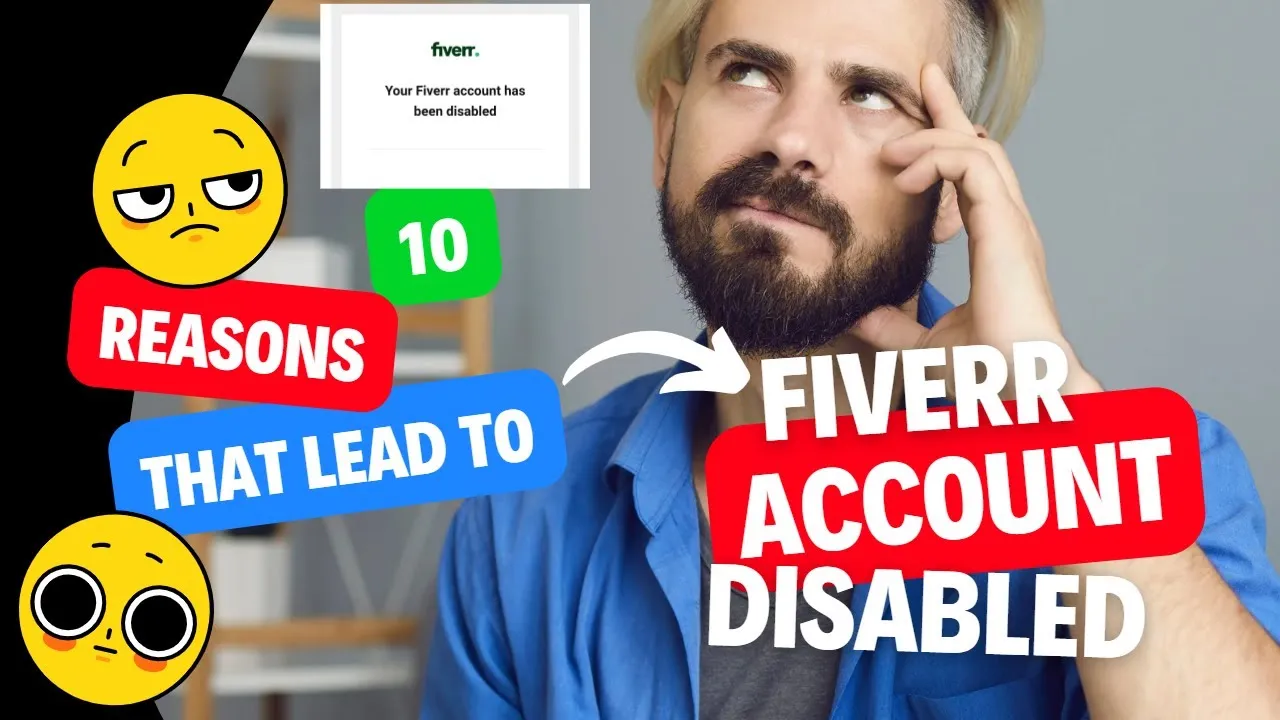In the gig economy, platforms like Fiverr have revolutionized how freelancers and clients connect. If you’re considering diving into this world, you might wonder, "Can I do Fiverr without a registered business?" It’s a common question, and I’m here to break it down for you. Let’s explore the ins and outs of Fiverr and what it means to operate your freelance gig legally and effectively.
Understanding Fiverr and Its Platform

Fiverr is an online marketplace that allows freelancers to offer services, known as "gigs," to clients worldwide. The platform is particularly popular for creative services, including graphic design, writing, digital marketing, and programming. But what makes Fiverr so appealing?
Here’s a quick overview of some key features of Fiverr:
- User-Friendly Interface: Fiverr's platform is designed for both buyers and sellers, making it easy to navigate and find the right gigs or freelancers.
- Diverse Range of Services: You can find everything from simple logo designs to complex website development—all in one place.
- Flexible Pricing: Gigs start at just $5, hence the name, but price varies based on complexity and the freelancer's experience.
- Global Reach: Fiverr connects freelancers with clients from all over the world, expanding your potential client base significantly.
But before you jump in, it’s essential to understand how Fiverr operates on a broader scale. Here are a few critical aspects of the platform:
| Aspect | Description |
|---|---|
| Sign-Up Process | Creating an account is straightforward and requires minimal information. You can join as a buyer or seller. |
| Payment System | Fiverr handles payments effectively, taking a commission from each transaction, which ensures secure payments for both sellers and buyers. |
| Buyer and Seller Ratings | After a transaction, users rate each other, building a reputation system that helps maintain quality on the site. |
Understanding how Fiverr operates will empower you as a freelancer, whether or not you register a business. Knowing the platform's features and dynamics can help you make informed decisions as you navigate this exciting opportunity.
Also Read This: How to Not Get Scammed on Fiverr: A Guide from Reddit Users
What Does It Mean to Be a Registered Business?

When we talk about being a registered business, we're referring to a legal process that identifies your enterprise as a legitimate entity in the eyes of the government. This involves obtaining necessary permits, licenses, and registrations, which can vary depending on where you live and what type of business you're operating. But let's break it down a bit:
- Legal Recognition: A registered business enjoys legal status. This means you can enter contracts, open a business bank account, and even protect your personal assets from business liabilities.
- Tax Obligations: When you're a registered business, you have specific tax responsibilities. You may need to collect sales tax, file taxes differently, and report your income to the Internal Revenue Service (IRS) or the appropriate local tax authority.
- Credibility: Being registered boosts your credibility. Clients and customers are often more inclined to engage with businesses that are officially recognized. It indicates that you're serious and professional.
- Compliance with Regulations: Many industries have regulations that require businesses to be registered. This can involve anything from health and safety codes to labor laws.
- Access to Funding: If you're looking for loans or investors, having a registered business puts you in a better position to acquire funding.
In summary, being a registered business means you’re officially recognized by the government, which comes with both responsibilities and benefits that can help you grow your brand more effectively.
Also Read This: What is Fiverr App Used For?
Freelancing on Fiverr without a Business Registration

So, can you freelance on Fiverr without having a registered business? The answer is yes! Many people dive into freelancing on platforms like Fiverr without formal business registrations. Here's what you need to know:
- No Need for Registration: Fiverr does not require you to register your freelance services as a business. You can create a profile and start offering your skills straight away.
- Tax Considerations: However, while you don't need a business registration, you still need to report any income you earn from Fiverr. Depending on your locality, earning a certain amount might trigger tax obligations, so it’s essential to keep accurate records of your earnings.
- Self-Employment Status: Operating as a freelancer puts you in the category of a self-employed individual. This means you lose certain protections that come with being a registered business but gain flexibility in how you manage your work.
- Building Your Brand: Starting without a registered business allows for experimentation. You can test your services, understand the gig economy, and eventually transition into a registered business if you choose to scale up.
So, if you're eyeing that Fiverr marketplace and wondering about the need for a registered business, relax! You can jump right in, gain some invaluable experience, and decide later if you want to formalize your freelancing gig into an official business.
Also Read This: How to Launch Your Career as a Freelance Film Editor
Legal Considerations for Unregistered Freelancers

When it comes to freelancing, especially on platforms like Fiverr, understanding your legal standing is crucial. While you might be keen to dive into the gig economy without the formalities of a registered business, there are several legal considerations to keep in mind.
First off, working without a registered business means you’re operating as a sole proprietor in many jurisdictions. This setup has its pros and cons:
- Easy Setup: Starting as a sole proprietor is typically straightforward; you can begin offering services immediately without formal registration.
- Personal Liability: One major downside is that you might expose your personal assets to business liabilities. If a client claims damages or issues a lawsuit, your personal savings and possessions could be at risk.
- Contractual Issues: Without a registered entity, it can be more challenging to enforce contracts. Clients may view unregistered freelancers as less reliable, which could impact your business prospects.
- Regulatory Compliance: Depending on where you live, there may be specific regulations regarding freelance work that you need to comply with, even if you aren't registered.
Lastly, it’s imperative to check local laws and regulations regarding freelance work. You might find that certain professions require licenses, and working without them could land you in hot water.
Also Read This: Understanding the Meaning of Revision in Fiverr
Tax Implications for Non-Registered Businesses
Even if you are not a registered business, it’s essential to recognize that your income from Fiverr is still taxable. The tax implications for unregistered freelancers can be a bit tricky, so let’s break this down.
Here are some key points to consider:
- Self-Employment Tax: If you earn over a certain threshold, you’ll likely need to pay self-employment tax, which covers Social Security and Medicare. In the United States, for example, this rate is about 15.3% on your net earnings.
- Tracking Income and Expenses: Make sure to keep thorough records of your earnings and any business-related expenses, like software subscriptions or advertising costs. This can help reduce your taxable income.
- Quarterly Tax Payments: Unlike traditional employment, where taxes are automatically withheld, freelancers often need to pay estimated taxes quarterly. Missing these payments can lead to penalties.
- Deductions: Even if unregistered, you can potentially claim certain deductions, which can be a relief during tax season. Common deductions include home office expenses, internet costs, and equipment used for your freelancing services.
In summary, while you can absolutely work as an unregistered freelancer on Fiverr, it’s vital to stay informed about your tax obligations. Ignoring these can lead to unwelcome surprises when tax season rolls around.
Also Read This: How to Sell Shirts on Fiverr
7. Pros and Cons of Operating Without a Registered Business
So, you’re considering jumping into the Fiverr marketplace without a registered business? It’s an intriguing option that comes with its own set of advantages and challenges. Let’s break it down.
Pros
- Flexibility: Operating without a registered business usually means you can set up your profile quickly and start selling your services almost immediately. No lengthy registration forms or legal requirements—just creativity and hustle!
- Lower Initial Costs: You can save on costs associated with registering a business. This can be particularly appealing for freelancers just starting out or testing the waters of their gig.
- Simplified Tax Filing: Since you’re not registered, you might find tax filing simpler, at least in the initial stages. Earnings can be reported as personal income, though you should still keep track of your revenues.
Cons
- Limitations on Growth: Not having a registered business can hinder your ability to grow. Many clients prefer dealing with formal entities, especially for bigger projects.
- Legal Risks: Operating as an individual means you’re personally liable for any financial or legal issues that may arise from your gigs, which could jeopardize your personal assets.
- Professionalism Perception: Some clients might perceive an unregistered freelancer as less professional than those with a formal business. This could impact your opportunities.
In summary, while there are some appealing benefits to flying under the radar, you should weigh them against the potential risks and limitations. Think carefully about your long-term goals!
Also Read This: How to Build a Career as a Freelance Community Manager
8. Tips for Success on Fiverr as an Unregistered Freelancer
So, you’ve decided to take the plunge into freelancing on Fiverr without a registered business. Awesome! Here are some handy tips to help you thrive in this dynamic marketplace.
1. Create a Strong Profile
Your Fiverr profile is your storefront. Make it shine! Use a clear profile picture, and craft a compelling bio that reflects your skills and personality. Don’t forget to list your services in an easy-to-understand manner!
2. Focus on Quality
Quality over quantity is the name of the game. Instead of offering a wide range of services, specialize in a few that you can deliver exceptionally well. Clients love quality work!
3. Communicate Effectively
Good communication is key. Respond to inquiries promptly and proactively reach out to clients for clarification. It builds trust and can lead to repeat business.
4. Build Your Portfolio
Even as an unregistered freelancer, having a strong portfolio is crucial. Showcase past work samples, or create samples if you're just starting out. Visual proof of your skills can capture potential clients' attention.
5. Gather Reviews
Reviews are gold on Fiverr. After completing a gig, kindly ask your clients to leave a review. Positive feedback can significantly enhance your credibility and attract more clients.
6. Price Competitively
While you might be eager to start, pricing your services too low can devalue your work. Research what others are charging and price your gigs competitively based on your skills and the value you bring.
7. Promote Yourself
Don’t be shy about promoting your services! Utilize social media platforms, join relevant online communities and forums, and network with potential clients. The more visibility, the better!
There you go! With these strategies, you’ll be well on your way to carving out a fruitful freelancing path on Fiverr, even without a registered business. Now, go out there and show the world what you can do!
Can I Do Fiverr Without a Registered Business?
Fiverr is a popular online platform that allows freelancers to offer their skills and services to clients worldwide. One of the common questions many potential freelancers have is whether they can operate on Fiverr without registering a formal business. The answer is relatively straightforward, and it depends on several factors related to your personal circumstances and local regulations.
Here are some key points to consider:
- No Legal Requirement: In most cases, you do not need to have a registered business to start selling on Fiverr. You can work as an individual freelancer and offer your services without formal registration.
- Tax Implications: While you don't need to register a business, you are still required to report your earnings. Depending on your location, this may involve paying self-employment taxes, even if you're working as an individual.
- Income Thresholds: Some countries may require business registration if your earnings exceed a certain threshold. It is essential to check with local regulations to ensure compliance.
- Branding and Professionalism: Although not required, having a registered business can enhance your credibility and professionalism. It can also help you in creating a cohesive brand identity.
The platform provides avenues for freelancers to showcase their services effectively, regardless of their business registration status. Always consult a financial or legal advisor to understand the implications of your earnings and ensure you adhere to relevant regulations.
In conclusion, while you can start offering services on Fiverr without a registered business, it is crucial to stay informed about local laws regarding taxes and registrations to operate legally and professionally.



